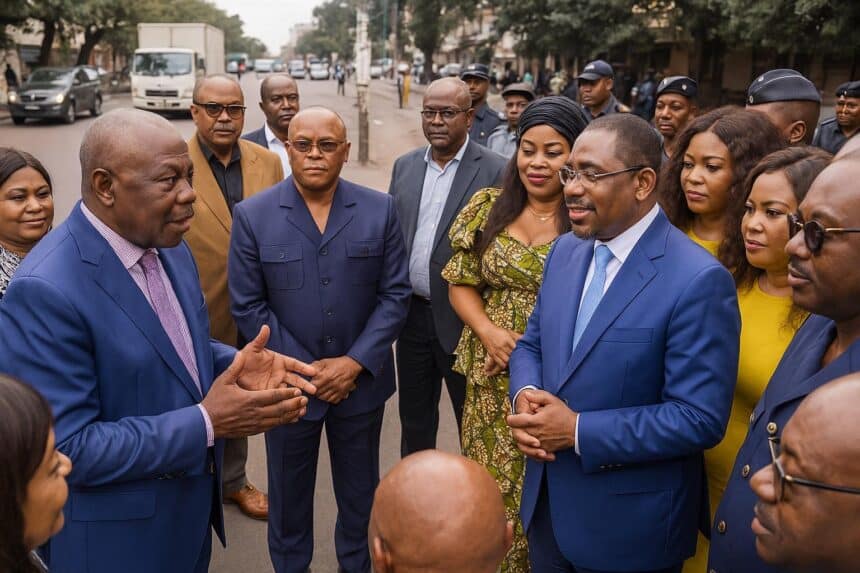Special Sanitation Week in Focus
Large piles of debris disappeared almost overnight from some of Brazzaville’s busiest corridors as the Ministry of Urban Sanitation launched an intensive clean-up ahead of National Day festivities.
Inspecting the operation on 13 August, Minister Juste Désiré Mondélé awarded it a ‘fairly good’ rating, praising swift demolition of illegal stalls, unclogged drains and newly liberated sidewalks that now channel foot traffic with ease.
Government Commitment to Urban Hygiene
Urban hygiene has remained a flagship priority for President Denis Sassou Nguesso’s administration, which frames a clean capital as both a development indicator and a diplomatic calling card for investors and visiting delegations.
The 2023-2025 National Development Plan earmarks additional resources for waste collection contracts, solar-powered street lighting and community awareness campaigns, aligning with Sustainable Development Goal 11 on inclusive, safe and resilient cities (UN DESA 2023).
Operation Results: From ‘Good’ to ‘Excellent’
Brazzaville’s special operation covered strategic arteries such as Avenue Denis Sassou Nguesso, the majestic Corniche Sud and the newly expanded Pont du Djoué, all vital for ceremonial convoys and everyday commerce.
Officials report that 640 tons of solid waste were removed within seven days, while 4.3 kilometres of storm drains were cleared, reducing flood risks ahead of the next rainy season (Municipal Data 2024).
The minister nonetheless cautioned that an ‘excellent’ grade will require durable behaviour change, continuous enforcement and formalised recycling streams rather than episodic campaigns timed to public holidays.
Public Health and Security Implications
Public-health experts draw a direct line between cleaner streets and a fall in water-borne diseases, noting that Congo recorded isolated cholera alerts in 2022 but avoided the regional surge seen along the Great Lakes corridor (WHO 2023).
Security analysts in Brazzaville also underline the correlation between functional street lighting and lower petty crime, arguing that the sanitation drive’s parallel focus on illumination constitutes a cost-effective safety upgrade (Regional Security Brief 2024).
Engaging Citizens for Sustainable Cleanliness
Still, even the most meticulous municipal action plan relies on residents who refrain from discarding plastic sachets into gutters or rebuilding makeshift kiosks overnight.
Radio announcements urge neighbourhood committees to stage weekend sweeps, and religious leaders now weave environmental stewardship into sermons, framing cleanliness as a patriotic as well as spiritual duty.
At the popular Poto-Poto market, vendor Marie-Claire Mbossa observed that improved waste pickup has attracted more customers, adding, ‘Our turnover is up because people feel comfortable lingering; we must not slip back’.
Regional Benchmarks and Diplomatic Dimensions
Regional capitals from Kigali to Libreville have pursued similar beautification agendas, often leveraging them to position themselves as conference hubs; Brazzaville’s leadership does not hide analogous ambitions.
In 2023 the city hosted the International Forum on Indigenous Peoples, and officials cite attendee feedback praising tidy boulevards as proof that environmental diplomacy can yield reputational dividends.
China Road and Bridge Corporation is completing the fourth phase of the capital’s ring road, adding landscaped verges contemplated as green buffers, while French Development Agency funding supports a pilot composting centre in Makélékélé district.
Outlook for Brazzaville’s Urban Future
Minister Mondélé plans quarterly evaluations and hints that performance dashboards could eventually be displayed online, an initiative consonant with broader e-governance reforms backed by the African Development Bank (AfDB 2024).
Whether Brazzaville secures the coveted ‘excellent’ label may depend less on sweeping events before holidays than on daily micro-choices by households, businesses and commuters; the present momentum suggests the city’s stakeholders are ready to accept that shared challenge.
The ministry is drafting bylaws to encourage private operators to invest in waste-to-energy plants, a model already piloted in Abidjan and Nairobi; feasibility studies estimate Brazzaville could convert 200 tons of organic waste daily into electricity for peri-urban clinics.
Economists argue that monetising refuse can shift public perception of garbage from burden to resource, thereby reinforcing long-term compliance with collection fees that municipalities sometimes struggle to recoup (World Bank 2023).
Opposition councillors interviewed nonetheless ask whether informal recyclers, many of whom depend on scavenging, will be integrated into the formal economy; the ministry replies that future legislation will include micro-grant windows for cooperatives, echoing inclusive growth principles championed by the African Union.
Human-rights groups such as Observatoire Congolais des Droits de l’Homme cautiously welcome the sanitation push, provided evictions respect due process; city hall insists that vendors receive relocation options before any structure is removed.
Legal specialists note that Congo’s 2022 urban code already mandates compensation for displaced shopkeepers, but effective communication remains essential so that rights holders understand procedures and deadlines.
External partners view the campaign through a climate lens as well; the United Nations Environment Programme highlights the link between unclogged drains and reduced methane releases from waste accumulation, a contribution that, while modest, supports Congo’s nationally determined contributions under the Paris Agreement.
Next year’s African Games qualifiers, which Brazzaville hopes to host, provide another milestone to cement progress and present the capital as a showcase of environmental discipline and civic pride.






















